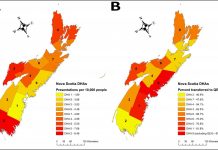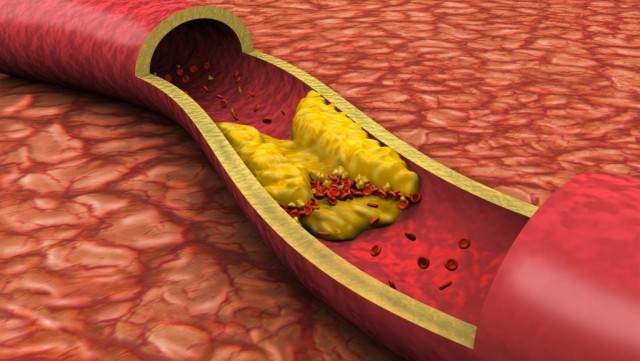August 2005 - Definitive evidence to explain how the drug nitroglycerin relieves chest pain has resulted from a new study by Howard Hughes Medical Institute investigators at Duke University Medical Center. Nitroglycerin relaxes blood vessels to boost blood flow, yet the mechanism by which the drug works has remained a matter of scientific controversy.
The findings bolster earlier indications that the drug may be ineffective for certain patients, and may place others at risk, the researchers said. The results also suggest that certain other drugs should be avoided by heart patient's taking the blood vessel dilator, as those drugs' activity might counteract nitroglycerin's effects. Such drugs include sulfonylureas used by diabetics, chloral hydrates used for sleep disorders and acetaminophen (e.g. Tylenol). Alcohol may also block the effect of nitroglycerin, said the researchers.
The researchers found through studies in mice that the cellular powerhouses -- known as mitochondria -- break down nitroglycerin to release nitric oxide, thereby opening blood vessels and lowering blood pressure. Nitric oxide normally present in the bloodstream plays a critical role in controlling blood vessel relaxation.
Nitroglycerin loses its effects on blood flow in animals lacking a particular mitochondrial enzyme called aldehyde dehydrogenase (mtALDH), the Duke team reported in the August 23, 2005, Proceedings of the National Academy of Sciences.
"Doctors have prescribed nitroglycerin for the relief of chest pain for some 150 years, yet the mechanism by which the drug works has remained a matter of debate," said study author Jonathan Stamler, M.D., at Duke. "The findings confirm that mtALDH is critical for nitroglycerin action."Continue Reading Below ↓↓↓
"The results should bring closure to long-standing scientific controversy, and will likely change the way physicians deliver nitroglycerin therapy to patients," he added. "These findings should certainly motivate a reassessment of this class of drugs."
First discovered in 1847 and brought to public prominence by the famed Alfred Nobel, who manufactured it first as an explosive, nitroglycerin is a common treatment for chest pain and heart failure. While the drug can effectively relieve chest pain, it tends to lose it effectiveness over time, Stamler said. More recent evidence has raised additional concerns about the drug's potential to cause long-term injury to the heart, and perhaps even death.
As a result of the drug's long history of use, its benefits for patient outcomes have never been demonstrated through the rigorous clinical trials that are now standard in cardiovascular care, Stamler explained.
In normal mice, treatment with nitroglycerin led to a drop in blood pressure, which increased with drug dose, the researchers showed.
Mutant mice lacking mtALDH lose the ability to process nitroglycerin, the team reported. As a result, the drug failed to lower blood pressure in the mutant mice at doses comparable to those prescribed to patients.
"The current study finds that mtALDH is both necessary and sufficient for generating vasodilation from clinically relevant levels of nitroglycerin," Stamler said.
Animals unable to process nitroglycerin continued to respond to alternative nitrate drugs that dilate blood vessels, suggesting that those drugs work through an independent mechanism.
"We thought that all of these drugs worked in the same way through the release of nitric oxide," Stamler said. "The current findings require us to revisit the implications of the use of these drugs."
Chronic use of the drug could lead to mitochondrial damage, which may ultimately increase patients' cardiovascular risk, Stamler said. Therefore, the drug should be prescribed judiciously, he added.
Sustained use of the drug might place some patients at particular risk, Stamler said. For example, physicians should use caution in treating patients, such as those with diabetes, who often already suffer mitochondrial damage.
Continue Reading Below ↓↓↓
The drug might also be less effective for patients with particular variants of the ALDH gene. Notably, many Asian people carry a mutant version of the gene characterized by reduced ALDH activity. The lower activity enzyme would leave such patients less responsive to nitroglycerin therapy, Stamler said.
Furthermore, he added, patients taking nitroglycerin should perhaps avoid taking other classes of drugs that also inhibit activity of the mitochondrial enzyme. They include sulfonylureas, chloral hydrates and acetaminophen. Alcohol may also block the effect of nitroglycerin, Stamler said.
"Heart patients who take nitrate drugs such as nitroglycerin might do better if they did not take other drugs with effects on this enzyme," Stamler said. "Alternatively, patients taking those drugs should not be prescribed nitroglycerin. Further clinical study will be required in order to work such issues out."
The principal author on the study was Zhiqiang Chen. Collaborators on the study include Matthew Foster, Jian Zhang, Lan Mao, Howard Rockman and Douglas Hess, all of Duke; Toshihiro Kawamoto of University of Occupational and Environmental Health in Japan; Kyoko Kitagawa of Hamamatsu University in Japan and Keiichi Nakayama of Kyushu University in Japan.
Source: Duke University Medical Center











